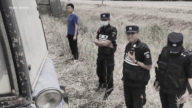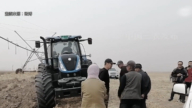【新唐人2013年09月21日訊】有大陸作者撰文說,當年中共搞的土改,充滿了血腥恐怖,殺死了200萬所謂的「地主分子」。而台灣在蔣介石領導下搞的農村改革沒有鬥一個人,也沒有死一個人,而是用和平的經濟手段完成的。評論者指出,共產黨的階級鬥爭理論注定了兩岸土地改革的不同。
大陸某中學語文高級教師王貴成在《鳳凰網》撰文說,台灣的農村改革是政府先出錢,把土地買過來,再根據當地農民的實際需要和能力,用分期付款的方式,把土地賣給貧苦農民。農民為國家工業化提供產品,從每年的獲利中逐年還給國家。
而對於出賣土地者,政府提供優惠政策,幫助他們用賣地獲得的資金,開發企業、工商業和服務業等現代產業。由於從事現代產業的收入比地租收入要多的多,因此他們非常樂意將土地賣給政府,將賣地的錢轉為資本發展現代企業。
北京天則經濟研究所副所長馮興元指出,共產黨建政前靠所謂的「打土豪,分田地」取得農民的支持。奪取國民黨的政權後,還是進一步推行這個政策,不管土地來源是否正當,只要你土地多,你就是地主。
北京天則研究所副所長馮興元:「我爺爺原來有很多田地房子,都抽鴉片給敗掉了。敗掉以後我家就評了一個中農,就沒事了。還有很多就是他很勤儉,有錢就買地,買到一定程度之後,就評為地主了。我愛人他爺爺就是這樣的。那個時代不講正義的,它是為了一個目的,然後不擇手段的。」
在中共土改中,殺地主是按照比例和名額來完成任務,完全不分青紅皂白。
馮興元:「我們寧波有一個村莊,有一個地主叫大無賴,有一個叫小無賴。好像是小無賴這個人特別好。大家都以為小無賴不會打死,但是沒有想到兩個人都被槍決了。」
文章作者王貴成認為,台灣土改最值得稱道的是「階級合作」式的辦法。「地主、農民和政府坐下來慢慢商量解決土地問題的法子,叫農民得益,地主也不受損失。」地主的土地雖被徵收,但從中獲得大量的股票,搖身一變,成為新興的工商巨頭。農村改革使台灣的經濟全面發展起來了,通過十幾年的努力,進入了世界先進國家的行列。 70年代台灣經濟騰飛,成為舉世矚目的亞洲四小龍之一。
原中共國務院農村發展研究中心研究員姚監復指出,中共並非想不到和平的方式,而是本質決定了它會使用暴力手段。
原國務院農村發展研究中心研究員姚監復:「和平土改是挨批的。葉劍英,廣東準備和平土改,華僑的地是他自己勞動掙得錢買的地,葉落歸根用的。想和平土改。最後也不行,還是階級鬥爭。關鍵問題就是階級鬥爭。一分為二,你吃掉我,我吃掉你,你死我活。」
作者王貴成引述一位留美的華人博士說,蘇聯、中國都是「消滅」了地主,致使兩國的農業發展緩慢,至今沒有完成從農業經濟轉軌到工業經濟﹔歐美各國以及亞洲四小龍則是「消滅」了貧農,農民成了工人,地主成了資本家,農業經濟過度到了工業經濟。中國人是越乾越窮,人家是越乾越富。
姚監復指出,共產黨的整個理論就是階級鬥爭,崇尚暴力革命,它的字典裡面就是「消滅」這個詞。
採訪編輯/秦雪 後製/孫寧
Killing Is the Word in China’s Land Reform
Mainland authors wrote that land reform in China
was full of bloody terror.
Two million landlords were killed
by the Chinese Communist Party (CCP).
Whereas, in Taiwan, under the leadership of Chiang Kai-shek,
the rural reform had no fighting, and not one person
had to die; it was accomplished by peaceful economic means.
Commentators point out that the communist theory of class
struggle made the difference between Taiwan and Mainland China.
Wang Guicheng, senior language teacher in a middle school,
said that the Taiwanese government bought the land from landlords,
then sold it to farmers.
Poor farmers used an installment plan to buy the land
according to their actual needs and their abilities to pay.
Farmers provide produce for the country and they pay
for the land with their profits every year.
The government provides incentives to landlords
to establish enterprises, business and services.
Incomes from modern industries were much more than rent
from land, so landlords were happy.
Money from land sales thus turned into capital development
of modern enterprises.
Feng Xingyuan, deputy director of Beijing Institute
of economics:"Before the CCP took over China,
farmers supported its policy of fighting landlords
and dividing the land.
Once they seized China, they continued to implement
this policy regardless of the legitimacy of the land.
My grandfather used to have many houses and a lot of land.
However, he lost them due to smoking opium,
so nothing bad happened to him.
He was a very hard working man and bought land
whenever he had saved enough money.
My father-in-law was the same way.
After one had accumulated enough land,
one became a landlord.
Killing landlords during the CCP’s land reform was carried
out in accordance with the proportions and killing quotas."
Feng Xingyuan: “In a Ningbo village, there were two
landlords, and people called them big rascal and little rascal.
Everyone thought the little rascal was nice and would
not be killed, but both of them were shot to death.”
Author Wang Guicheng believes that Taiwan’s land reform
was remarkable for its class collaboration.
Landowners, farmers and the government sat down
to discuss ways to solve the land problem so that
farmers would benefit and landlords would not be hurt.
After landlords replaced their land with stocks of enterprises,
they turned into industrial and commercial giants.
Rural reform enabled a full development of Taiwan’s
economy, and over a decade of efforts,
Taiwan entered the ranks of advanced countries in the world.
In the 1970s, with Taiwan’s skyrocketing economy,
it became one of the four little dragons in Asia.
Yao Jian Fu, researcher of the former State Council Rural
Development Research Center points out that the CCP
knew about peaceful means, but essentially decided
to use violent means.
“Peaceful land reform was being criticized at that time.
Ye Jianying, a former leader of the CCP, was prepared
to adopt peaceful land reform in Guangdong.
It did not work out that way, and in the end,
the class struggle won.
In a class struggle, you gobble me up, and I gobble you up,
which is a matter of life and death."
Wang Guicheng quoted a Chinese scholar in America
who said that in both the Soviet Union and China,
landlords were eliminated, which caused slow
agricultural development.
They have not transformed from an agricultural economy
into an industrial economy.
In Europe, the United States and the Asian four dragons,
they eliminated poor farmers instead—farmers became
workers and landlords became capitalists—which turned
an agricultural economy into an industrial economy.
The harder the Chinese people work, the poorer
they become.
On the contrary, people in other countries become richer
by working harder.
Yao Jian Fu points out that the CCP’s entire theory revolves
around class struggle, advocating violent revolution.
In the CCP’s dictionary, there is one word, “destroy."




























